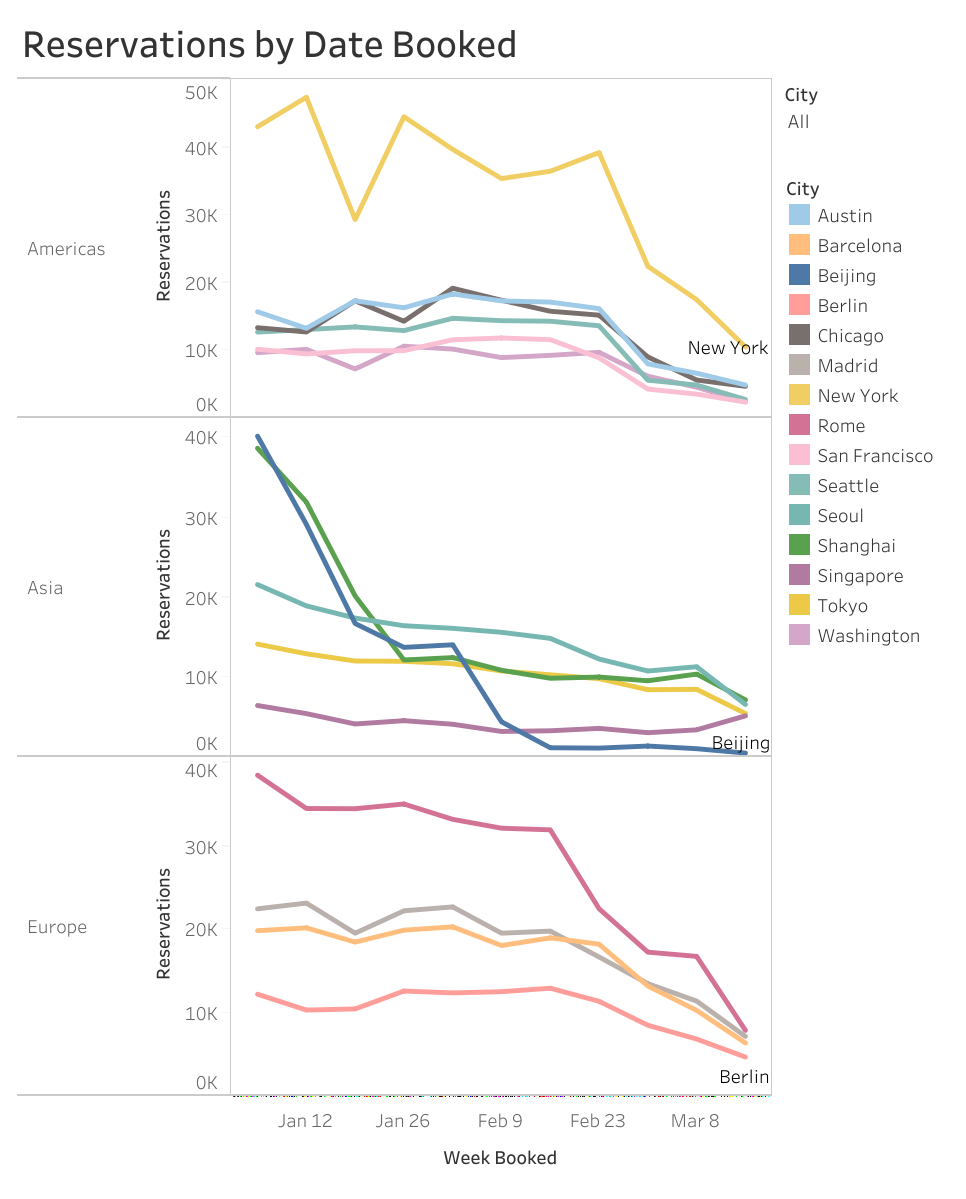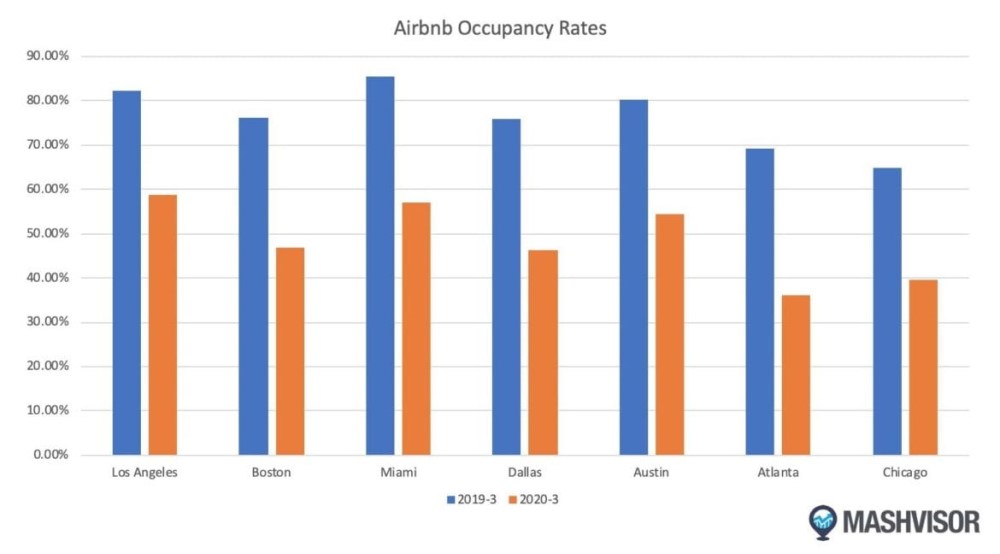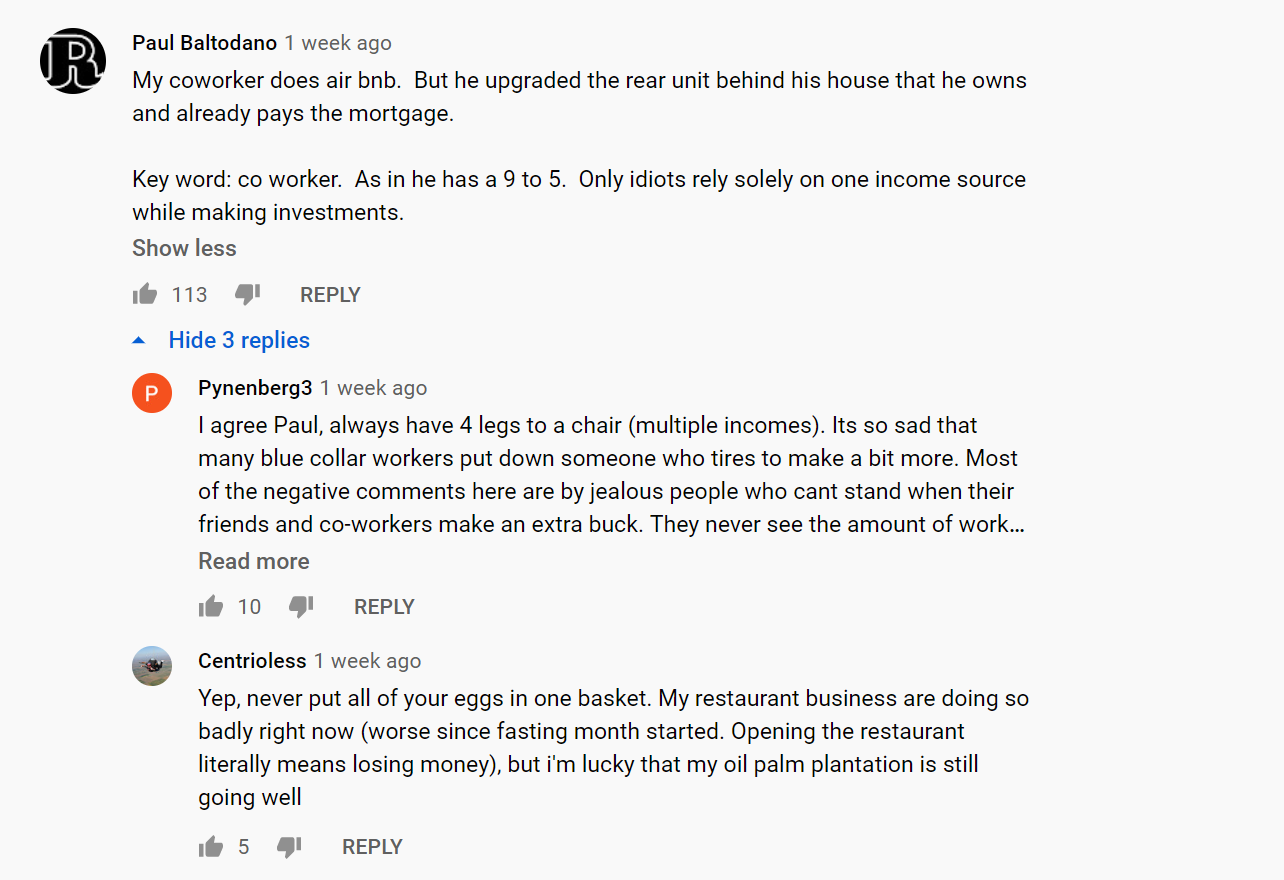Can Airbnb Survive the Cancellation Wave Due to Coronavirus Outbreak?
As a leading home-sharing platform, Airbnb has fundamentally transformed not only the travel industry but the short-term rental market, reshaping neighborhoods and whole cities in the process as short-term rentals swept through touristy parts of the world. In March of 2017, Airbnb was valued at $31 billion; last year, the company was estimated to be worth over $30 billion dollars and was scheduled to go public in 2020. Everything seems to be in a good shape… Then came the COVID-19 pandemic, presenting whole new challenges!
Since the travel industry is on hold and national economies are staggered, Airbnb is amongst the businesses that have been hit hardest by the coronavirus pandemic. Hosts who have become reliant on income properties to pay their bills are struggling due to the lack of business. For the time being, the forecasts for the Airbnb industry remain foggy – actually, with cancellations adding up and crippling the whole travel landscape, guests, hosts and investors alike are left asking what Airbnb will look like after the novel coronavirus pandemic, or whether the company will survive at all.
Airbnb Amid Coronavirus Pandemic: Cancellation Wave
As travel bans took effect in March, demand for Airbnb and short-term rentals have taken a hit worldwide. Data analysts at AirDNA reported that bookings have tanked and booking cancelation reached an all-time high. According to AirDNA, bookings across Europe collapsed in March, dropping staggeringly 80% compared to the previous week in the week beginning March 9, and another 10% on top of that in the week of March 16.
As for the Airbnb market in the United States, where virus response lagged, the figures for drops in bookings are uneven yet less dramatic. By the middle of March, bookings in New York City, San Francisco Bay Area, and Seattle had gone down over 50% compared to the week beginning January 5, with a decrease of over 35% in Washington, D.C., and Chicago.

According to Apostolos Filippas, assistant professor of information, technology, and operations at the Gabelli School of Business of Fordham University, discussing Airbnb hosts as a “monolithic” block is misleading. “[We] have two kinds of Airbnb owners: the people who took up another lease or bought another property to make it available online and then the people who had an extra room,” he shared. Given that business is down for both types, the former – those who are more dependent on revenue to pay a dedicated lease or mortgage – generally will suffer a tougher time.
“Our bookings in March all canceled,” shared Shauna Mahoney, a co-owner with her husband Chris of two properties: One is a family cabin, fully paid for, near Zion National Park in Utah; and the other, a house near the Glen Canyon National Recreational Area in Arizona, where Chris works for the National Park Service. Having bought the latter property last August, they then remodeled it as a family vacation spot that could more than pay for itself, until a pandemic stopped the business this year. “COVID-19 put a pause on travel,” said Karen Xie, and associate professor of service analytics at the University of Denver’s Daniels College of Business.
“Hosts on Airbnb are hit hard, especially those professional hosts who operate multiple Airbnb properties using leverage,” added Xie. “They are struggling to pay back mortgages to banks due to the halt of cash flow.” So far, most of them have chosen to hang in, “selectively blocking off their calendars to comply with local stay-at-home orders, in a hope to re-open the business when travel is back to normal in a few months.”
Beyond any doubt, booking cancelations will affect the Airbnb occupancy rate for hosts. According to Mashvisor’s Airbnb Calculator, Airbnb occupancy rates declined more than 35% in every major city in the US housing market in March of 2020 compared to the same period last year. To be more specific, let’s take a look over the below figures!

Airbnb Amid Coronavirus Pandemic: How It Weathered the Economic Storm and Supported Its Hosts
“We are partners- when your business suffers, our business suffers.” Brian Chesky, the founder of the home-sharing platform, spoke these words to hosts this week as he announced a $260 million Airbnb relief package. This came a few weeks after the World Health Organization officially labeled the coronavirus outbreak a pandemic. Travel bans, border closings, and mass quarantines were put in place across the world to help contain the spread of the coronavirus. Following this, Airbnb made the decision to allow guests to cancel bookings due to COVID-19 related circumstances – in which guests would receive a full refund or access to other refund options. As a result, Airbnb hosts were left with empty calendars, vacant rental properties and rooms, and no source of income for the foreseeable future.
To be more specific, under its COVID-19 “extenuating circumstances” policy, Airbnb guests who booked an Airbnb before or on March 14 and have a check-in date between March 14 and May 31 are allowed to cancel. In return, the Airbnb coronavirus cancellation policy would extend to guests a full refund or travel credit. To offer financial support to Airbnb hosts in the face of these cancellations, the company has put together a total of $250 million and from that money, will pay 25% of what a host would normally receive for a cancellation. For any reservations made after March 14, the COVID-19 extenuating circumstances policy will not apply to cancellations. The $250 million Airbnb relief package is coming from the company itself, at no cost to guests.
Furthermore, an additional $10 million will go towards supporting SuperHosts and Experience hosts in covering their rent and mortgage payments. In April, these hosts will be eligible for a grant of up to $5,000 from Airbnb -such an amount of money has been donated by Airbnb employees as well as the 3 co-founders, Brain Chesky, Joe Gebbia, and Nathan Blecharczyk.
Another noteworthy point is that several Airbnb guests are coming together to support the community of hosts who are in need during this struggling period. With a view to offering financial assistance to Airbnb hosts struggling due to the Coronavirus, Airbnb plans to facilitate this exchange between guests and hosts in April. In Brian Chesky’s message to Airbnb hosts, he shared, “We are creating a way for guests to send a note along with a contribution to any of the hosts who they’ve previously stayed with. We expect this to go live in April. We know that even a little goes a long way during this challenging time.”

Besides this relief package, Airbnb CEO also announced that the home-sharing company has been working to make sure that all Airbnb hosts will gain access to financial assistance from the CARES Act 2020. Whereas unemployment benefits are typically not extended to Airbnb hosts and other gig workers, self-employed individuals, or independent contractors, under the coronavirus stimulus package, Airbnb hosts are now eligible for up to 39 weeks of unemployment benefits along with the additional $600 a week for 4 weeks that the stimulus package has introduced for unemployed individuals during COVID-19. Additionally, Airbnb hosts may also qualify for small business loans and other financial assistance.
When it comes to Airbnb hosts’ responses, whilst some are welcoming the Airbnb relief package with open arms, several others have already taken their own steps to protect themselves from the loss of income. Actually, Airbnb rental properties are being placed on the long-term rental market worldwide and even for sale. Even, there are a notable number of Airbnb hosts who do feel that the payout of 25% will not be enough if the situation carries on any longer.




So, Will Airbnb Survive the Coronavirus Pandemic?
Tackling with such a fast-changing situation and a vague outlook, can the industry’s top player recover after lockdowns lift? The answer remains unforeseeable!
With lingeringuncertainties about how long the coronavirus and travel bans will last, things look dire indeed in the immediate future. Whether Airbnb can survive, whether it can bounce back fully from this crisis – and how quickly – also depends on how customers feel about traveling and staying in other people’s homes once the COVID-19 pandemic eases.
On the one hand, some hold the firm belief that traditional hotels might gain an advantage when the travel sector starts to recover due to fears on how regularly hygiene standards can be enforced in the short-term rental market. On the other hand, many more people remain wary of crowded hotels following a period of social distancing, which explains why some experts believe Airbnb will yield considerable benefits after the pandemic.
From the perspective of Airbnb executives and investors, so far, they have expressed strong confidence that the company is likely to recover after the COVID-19 outbreak. Actually, Brian Chesky did cite Puerto Rico as an illustrative example to highlight the resilience of his business model. Booking volumes bounced back swiftly after Hurricane Maria devastated the island in 2017.
More recently, let’s take a look over how the Airbnb business is getting back up in China. Despite almost suffering the hardest hit of Coronavirus, the president of Airbnb China turns out to be very optimistic and confident about the short-term rental market and the travel landscape, especially when China’s economy eyes economic recovery. Going into greater detail, he did explain that the company is experiencing huge growth in short-term trips since Chinese travelers on Airbnb are looking for domestic travel destinations.
In addition, whilst people might be wary of traveling to other countries after the COVID-19 pandemic, the desire and anticipation to travel again are still there, even if on a domestic level. Nonetheless, when exactly “the coronavirus crisis of Airbnb” will come to an end and what it would look like in US cities where Airbnb has been most affected remain mysteries.
How Can Airbnb Hosts Survive the Great Reservation Cancellation?
With the widespread impacts of such a “black swan” event, a downturn in the Airbnb economy is inevitable. Should you be a host owning an Airbnb investment property, you will be definitely wondering what to do during this time as travel bans and social distancing measures are still in effect.
Amongst available options, one course of action Airbnb hosts typically take is to “scramble” to find long-term renters and flocking to other platforms. On a talk with CNBC, Sean Ray, an experienced Airbnb host, shares that he normally rents out his 3-bedroom Dallas house for a few days at a time to travelers who find it listed on Airbnb. On Saturday, Ray spent the afternoon touring the property with a mother of two who showed up seeking a long-term rental and wearing an N-95 mask. “This is something that I’ve got to get done,” Ray said. “I won’t be able to survive much longer if I don’t get this thing rented.”
Ray as well as numerous Airbnb hosts are now listing their properties on competing sites and making them available for longer terms at discounted rates. These hosts are trying to stay afloat on mortgages and arbitrage leases after the demand for short-term rentals have suddenly dried up due to the coronavirus pandemic. Arbitrage is when a host rents a property and then rents it out to other people on Airbnb. “I’m putting someone in my house and crossing my fingers they’ll pay because I can’t evict them,” Ray genuinely shared. “But I can’t keep it on Airbnb because that’s a guaranteed loss.”
Furthermore, Airbnb hosts have been scrambling to find new guests or tenants for their properties since March 14, the day when the private tech company made a policy change to fully refund any guests who canceled their reservations between that day and April 14.
Actually, the change did override cancellation policies many hosts had in place for protection, costing many of them thousands of dollars in lost revenue. In addition to the cancellations, many hosts are having a tough time finding bookings for short-term stays. It’s why a whole lot of hosts are cutting rates, extending the duration of stays and searching anywhere they can for new bookings. “After they made that announcement, we received an avalanche of cancellations,” said Liam McLaughlin, who manages 14 properties in Pittsburgh, Pennsylvania, on arbitrage. “We are now just trying to survive by locking in people at week-long or month-long rates to just break even.”
In fact, whereas many of these hosts had previously exclusively listed their units on Airbnb, they are now turning to other websites such as Vrbo, HomeAway, Zillow, Apartments.com, and even Facebook Marketplace and Craigslist.
“The business model has completely all had to change,” said Ambur Storozynsky, a host who is converting two of her five arbitrage properties in Calgary, Canada, into long-term units. “There’s just zero demand for people who are coming for the weekend.”
Additionally, there exist some handy practices that Airbnb hosts can adopt:
- Set the minimum nights per stay to one: given inherent set-up and cleaning costs, many hosts seem to resist this, yer, what matters the most turns out to be if one night puts money into your pocket. Undoubtedly, the more bookings, the better treatment the listing gets in Airbnb’s listings.
- Consider longer-term rentals for people like travel nurses, those stranded in their travel plans, or travelers or essential who typically prefer long-term accommodations to quarantine, whether coming in from out of town or trying to avoid infecting family.
- Change the listing headline to stress cleanliness and safety. No matter how simple they may seem to be, some titles such as “CDC-recommended cleaning” or “fully stocked” do emotionally convey more value and help to calm people’s nerves. It is also worth mentioning that your space is great for a staycation, as a work-from-home alternative, or for families. Plus, let people know you provide some free amenities such as toilet paper, coffee, tea, supplies, or whatever so your would-be customers don’t have to go out and put themselves at risk.
- Put an emphasis on appealing features that would be a draw, such as family-friendly, washer/drier, fully equipped kitchen, quiet neighborhood, Netflix, laptop-friendly, staycation unit, and high-speed WiFi.
In addition to these measures, you could consider coming out of the passive mode and navigating your efforts for more sustainable business. What does this mean? To put it simply, instead of being solely dependent on other sites and scrambling to find an alternative in case of economic uncertainties, you can actively devote to build out your own independent business – to establish a website, invest on developing an app, design your own unique offerings, promote them on various social sites, handle all the dealing process, etc.
These things may turn out too overwhelmed for you to handle by yourself? Don’t panic! We are going to lend you a helping hand. With our on-demand online presence manager, even you’re a newbie to the business world, you will be assured that your business is in the good shape. Our ever-ready, dedicated team will empower you to work smarter, walking you through the most frustrating problems that come with running a business.

The Bottom Lines
With the threat of more cancellations and reimbursements as the pandemic cripples the travel landscape, guests, hosts, and investors alike are left asking what Airbnb will look like after the Covid-19 pandemic. Whether the ultimate answer turns out to be a positive or negative one, it’s a “must” that Airbnb hosts – instead of merely waiting – think of proper courses of actions to navigate themselves amid the pandemic. Whereas there’s probably no way that Airbnb hosts can completely avoid the pain, some smart moves and experimentation could minimize it.









